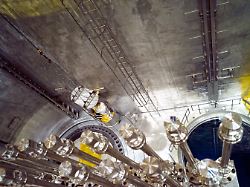Pace in the expansion of nuclear power
The Czech Republic wants to become a “center of nuclear energy”.
February 13, 2024, 12:26 p.m
In countries like Germany and Austria, there is great skepticism about nuclear energy. Unlike in the Czech Republic: Prime Minister Fiala wants to order up to four new reactor blocks. Critics warn, among other things, of high costs.
The Czech government is speeding up the expansion of nuclear power: the liberal-conservative Prime Minister Petr Fiala wants to order up to four new reactor blocks in one fell swoop, as he recently announced to the surprise of many observers. The current tender, which originally only envisaged the completion of a new reactor by 2036, has now been expanded. “Czech households, Czech citizens and Czech companies must have the certainty that there will be enough energy in the future – and at acceptable prices,” he explained his plan. “This is the basis of our prosperity.”
The Czech Republic, an industrial country, could become a “nuclear energy center”. Fiala expected a price reduction of up to 25 percent per reactor for a larger collective order. The French nuclear company EDF and the South Korean competitor KHNP are now called upon to submit their binding offers by the end of April. The decision could then come as early as May. The US company Westinghouse, which had received the contract to build the neighboring country’s first nuclear power plant in Poland, is no longer there. “This company’s offer was not binding, so it could not be included in the assessment,” said Petr Suler from the partially state-owned nuclear operator CEZ. Exactly how many reactors there will be is still unclear.
Incident at the Temelin nuclear power plant
The state as an investor can use all options, but does not have to, explained Suler. It is currently assumed that a decision will first be made about expanding the Dukovany nuclear power plant site by two blocks and only then about two more blocks in Temelin. Suler pointed out that the EU had classified nuclear power as climate-friendly under certain conditions. This was regulated via the so-called taxonomy regulation. Prague’s plans are causing uncertainty in neighboring foreign regions. The Temelin nuclear power plant, which currently has two VVER 1000/320 pressurized water reactors, is located less than 60 kilometers from the borders with Bavaria and Lower Austria. From Dukovany, which has four old Soviet VVER-440/213 tanks, it is just under 100 kilometers to Vienna.
Urban Mangold from the Bavarian “Platform against Temelin” said the Czech government’s plans endanger the safety of the Bavarian population. Nuclear power is expensive, dangerous and makes you dependent on uranium supplies. In the worst case, nuclear reactors could even become a military target. However, CSU politician Erwin Huber caused a surprise, welcoming the Czech expansion plans as “sensational”. Bavaria should secure electricity quotas, he told the Bayern media group. Just a few days ago, an incident reignited the concerns of many border residents about safety: There was a disruption in Temelin that led to the unplanned shutdown of the second reactor block. According to the operator CEZ, a generator cooler outside the nuclear area of the power plant had to be replaced.
Critics warn of high costs
The Czech government’s latest energy strategy plans to increase the share of nuclear energy in the electricity mix from a third to more than half by 2040. Coal-fired power generation is scheduled to end by 2033. The cabinet’s pro-nuclear course is largely met with approval among the population and the media. One of the few critics is Pavel Vlcek from the citizens’ initiative for environmental protection from the southern Bohemian town of Budweis (Ceske Budejovice). “Czech Republic’s politicians literally want the new reactor blocks at any price, almost hysterically,” he criticizes. Vlcek sees this as a result of the long-term lobbying work of the nuclear industry, which has secured a position that is unique in Europe. Financing could become the biggest stumbling block. Finance Minister Zbynek Stanjura had to admit on CT television that it was a “highly risky project”.
Analysts’ estimates of the total costs vary widely, ranging from more than 30 billion to almost 80 billion euros for four reactor blocks. Critics warn that this may not necessarily be worthwhile – depending on how prices on the electricity markets develop in the future. High costs are already incurred in advance: the government in Prague has just decided that over the next ten years more than 500 million euros will flow into the renewal of the transport infrastructure around the Dukovany nuclear power plant site in South Moravia – so that roads and bridges will later be able to cope with the enormous costs Construction site traffic has increased.
